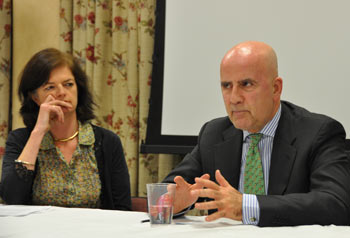
Photo by Janet Sassi
A journalist who spent years in El Salvador joined a Peruvian diplomat and a theology professor at Fordham on Nov. 16 to recall the lives of six Jesuit activists murdered during that nation’s brutal civil wars in the 1980s.
In the early morning of Nov. 16, 1989, Ignacio Ellacuría, S.J., Segundo Montes, S.J., Ignacio Martin-Baro, S.J., Joaquin Lopez y Lopez, S.J., Juan Ramon Moreno, S.J., and Amado Lopez, S.J., were shot to death when members of the Salvadoran military entered their residence at the University of Central America (UCA) in San Salvador.
A housekeeper and her daughter, Julia and Cecilia Ramos, were shot in their beds. The Jesuits were considered “subversives” by the Salvadoran government for their outspokenness and activism against the policies that oppressed the country’s poor.
Teresa Whitfield, author of Paying the Price: Ignacio Ellacuría and the Murdered Jesuits of El Salvador (Temple University Press, 1995) described the Jesuits as men who found their expression at UCA not just in teaching and research, but in “social projection”—activism based on the reality of what they were witnessing around them.
At that time, El Salvador was locked in a bitter civil war that pitted a people’s movement against a United States-backed military government that was repressive and murderous. It is estimated that 70,000 Salvadorans were killed during the decade-long struggle.
“In [Father] Ellacuría’s view, the reality [of war]made certain demands on where a university of Christian inspiration should stand,” said Whitfield, who was a young journalist at the time of the assassinations. “Ellacuría said a university should try to be free and objective, but that, sometimes, objectivity and freedom demand one to be partial.
“This, of course, is what got them into trouble,” she said, adding that government antagonism for the Jesuits grew as they allied themselves with some of the more radical parishes in San Salvador.
The murder of the Jesuits on the university campus marked a turning point, said Álvaro de Soto, the United Nations mediator who helped broker the Central American Peace Process negotiations to end the war.
“What the Salvadoran armed forces did not calculate was the outrage that these murders would create,” de Soto said. “Particularly in the United States Congress.”
A Democratic representative from Boston, Joseph Moakley, led a task force on El Salvador that proved the murders had been carried out by the Salvadoran military.
Congress used the commission’s findings to cut military aid to El Salvador, and the Salvadoran government negotiated an end to the war between the the Farabundo Martí National Liberation Front (FMLN) and the government in December 1991.
“Whether justice was done, I am not sure, but it certainly put El Salvador on the right path and gave an institutional basis that was far better than the form they started with,” de Soto said.
Fordham’s own community can take a message of inspiration from the story of the Jesuits on the UCA campus, said Michael Lee, Ph.D., assistant professor of theology.
Lee said that, as a liberation theologian, Father Ellacuría believed that the “crucified people” are actually the suffering poor in the world and the ones that “bear the weight of the world’s sin.”
In the UCA chapel, Father Ellacuría had placed graphic prints of victims of torture to form a station of the cross, said Lee, because “he wanted the presider at the Eucharist to see that broken body, that suffering of the people.”
“For Ellacuría, the encounter with the crucified Christ is best done not in the quiet of one’s own room, but with the ‘crucified’ that cry out and demand our attention,” Lee said.
Therefore, it is important for the academic community, Lee said, to continuously realize that “the point of [a university’s]work is not itself, but that its center is outside of itself,” in the real world where poverty and suffering exists.
“Our memory 20 years later of a university like UCA—with a center outside itself—is to ask ourselves how we can make that same commitment to see beyond these walls into the neighborhood, and into our own globalized realities,” he said.
Also on hand was a former FMLN member, Joaquin Chavez, who recalled the Jesuit Martyrs as men of peace.
“Their only weapons were their intellects and their spiritual convictions,” he said. “That’s how I like to remember them.”
The Nov. 16 event capped off a month of events on the Fordham campus to commemorate the 20th anniversary of the murders of the Jesuit Martyrs. On Nov. 13, five members of the Fordham community went to El Salvador to participate in an international celebration in their honor.
The events were sponsored by the Offices of Mission and Ministry, Campus Ministry, Global Outreach and the Dorothy Day Center for Service and Justice.
